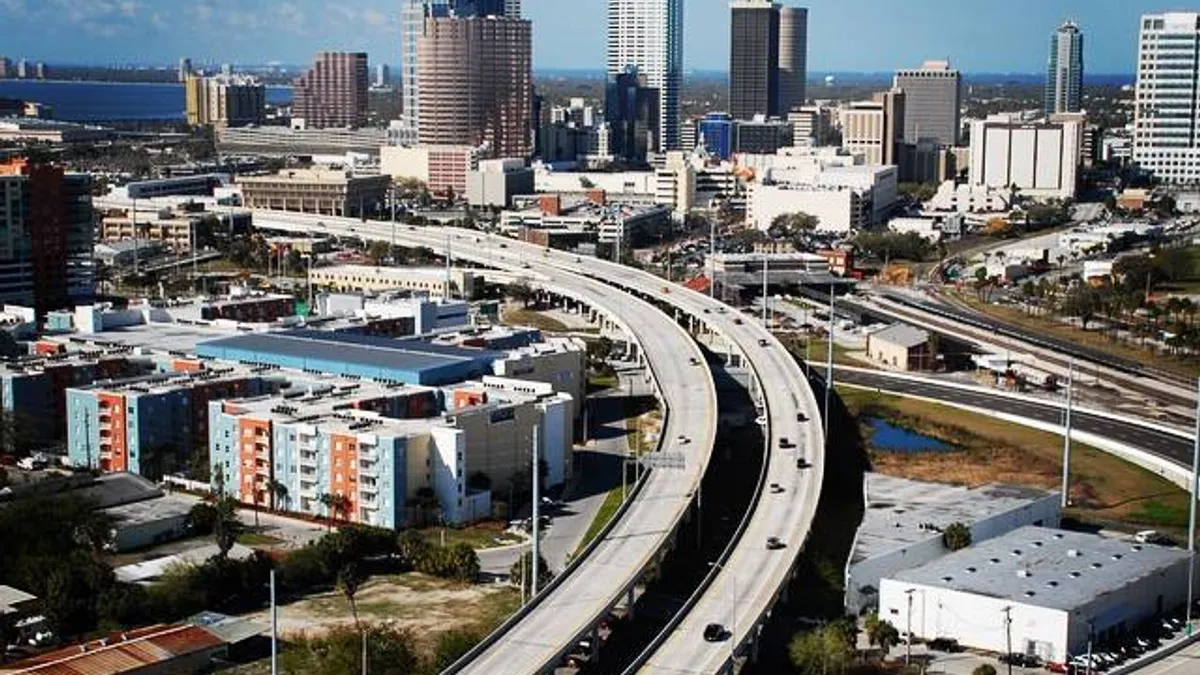Like many other cities throughout the United States, Tampa, Florida, is dealing with the economic restrictions and shutdowns necessitated by the worldwide coronavirus pandemic but, as in other jurisdictions, essential construction projects have been allowed to continue. Florida Gov. Ron DeSantis has also allowed projects that were under construction at the time he issued the state's Safer at Home Order to move forward as well.
In the Tampa Bay area, however, there is an added urgency to complete more than $1 billion of projects in time for the NFL's Super Bowl 55 in February 2021. These include a $200 million JW Marriott hotel in downtown Tampa and the first phase of the $550 million mixed-use Midtown Tampa project just a few miles from Raymond James Stadium, which will host the Super Bowl.
The big game, according to Carole Post, Tampa’s Development and Economic Opportunity Administrator, is still on despite the pandemic.
So that means the city's construction projects are forging ahead, and the priority is making sure workers are as safe as they are productive.
"When it became clear that construction was going to be deemed an essential service," Post said, "we started thinking about the implications of that and the thousands of [construction workers] that are not part of the shutdown."
The governor's order encourages contractors and other businesses to follow the Centers for Disease Control and Prevention (CDC) guidelines in protecting their workers but stops short of laying out specific protocols.
To that end, Tampa officials launched a COVID-19 construction site safety program for threshold buildings — those structures taller than three stories, or 50 feet in height, or with an assembly occupancy classification exceeding 5,000 square feet in area and/or an occupant content of more than 500 persons. There are currently 52 threshold projects within the Tampa city limits.
Those projects must:
- Designate a COVID-19 Compliance Coordinator, who must be on the jobsite during all work hours; be easily identifiable via a helmet, vest of other similar means; and be available to workers and city officials.
- Close all sites to the general public.
- Ensure that all personnel maintain a minimum distance of 6 feet from each other.
- Have handwashing stations equipped with soap and water and/or hand sanitizing stations in convenient locations.
- Prominently post CDC-approved COVID-19 information.
- Maintain 50% or less occupancy in jobsite trailers.
- Ensure that all individuals on site, with the exception of office workers, wear construction-grade gloves at all times.
- Limit food trucks to the outside perimeter of construction sites and make sure there is only one point of contact for both drop-offs and pick-ups in order to limit interaction with workers.
In addition to these guidelines, the city has also introduced a novel approach to ensuring that construction projects are in compliance — unannounced spot inspections by a team of independent nurses contracted by the city.
The way it works is that after receiving occupational safety training, licensed nurses visit these threshold projects up to three or four times a week to make sure crews are abiding by the program's requirements. So far, Post said, the nurses have reported that most jobsites have been in good condition, with only a few minor and easily-remedied deficiencies like a lack proper handwashing stations.
The city's efforts are made easier because it has consulted with developers about what should go into the program every step of the way. In fact, when the approximately eight-week program is done and the costs are tallied, developers will foot the bill.
"They were grateful for it," Post said, “and they were on board."
While Tampa labor and employment attorney Phillip Russell with Ogletree, Deakins, Nash, Smoak, & Stewart in Tampa acknowledged the city's efforts, he said that many of the larger contractors the program targets already have a deep bench of safety personnel, unlike smaller contractors who have limited resources and who could have also benefited from the nurse's visits.
However, he said, the city's order fills a gap in OSHA regulations, which don't yet include any standards related to COVID-19.
The level of compliance so far, though, is encouraging, Russell said, and shows contractors and owners were already committed to safety on those projects. "You don't necessarily need more government for employers to do the safe thing for their workers."
Something else that sets the city's program apart from OSHA is that it does not contain an enforcement provision, which means no citations, monetary fines or other penalties for noncompliance. If necessary, Post said, a Hillsborough County order now in effect would allow the city to take some action, but she doubted that would be necessary given that contractors have been following the rules thus far.
"We're not here to be punitive," Post said. "It's quite the opposite. We're here to try to keep [them] in business."













